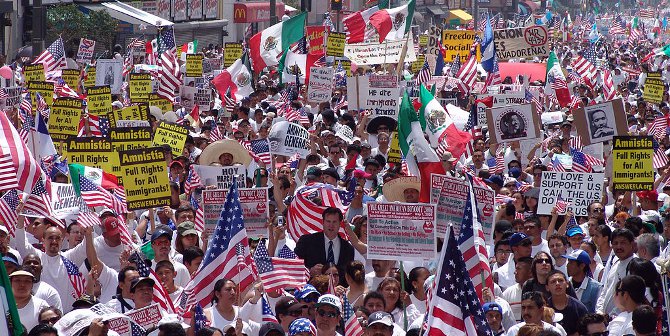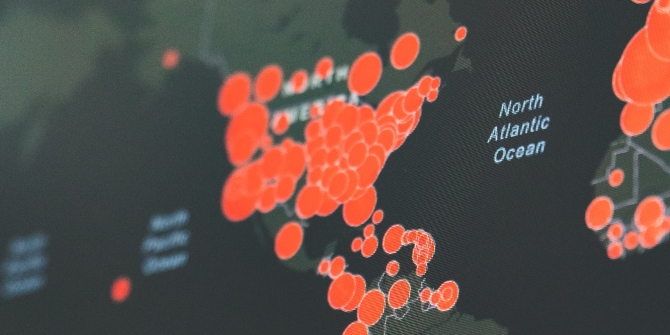 On Monday 17 October, the Phelan US Centre, with the Ralph Miliband Programme co-hosted the public event ‘The Rise and Fall of the Neo-Liberal Order’ with Professor Gary Gerstle. Lucy O’Donoghue summarises Professor Gerstle’s discussion of his work on the New Deal and Neoliberal orders and reviews the event’s Q&A segment.
On Monday 17 October, the Phelan US Centre, with the Ralph Miliband Programme co-hosted the public event ‘The Rise and Fall of the Neo-Liberal Order’ with Professor Gary Gerstle. Lucy O’Donoghue summarises Professor Gerstle’s discussion of his work on the New Deal and Neoliberal orders and reviews the event’s Q&A segment.
With the global economic crash, a society-changing pandemic, and a rise in contrasting political movements over the past 15 years, Gary Gerstle, Paul Mellon Professor of American History Emeritus at Cambridge University, described in his public lecture the end of the dominant neo-liberal world order that we have seen since the 1980s.
In the event chaired by the Director of the Ralph Miliband Programme at the LSE, Dr Robin Archer, Gerstle argued that there has been a decline in the neo-liberal order since the financial crisis of 2008.
Developing on his work in his book ‘The Rise and Fall of the New Deal Order’, written with Professor Steve Fraser, Gerstle addressed the ground covered in his new book ‘The Rise and Fall of the Neoliberal Order: America and the World in the Free Market Era’. He detailed two political orders from the 1930s to present day: the New Deal order which can be characterised as capitalism with the need for regulation, and the neo-liberal order which removes the centrality of the state in the running of the economy. Gerstle argues that the implications of the fall of the Soviet Union have been undertheorized; it left the field clear for capitalist economics to spread and neo-liberalism to take hold as the global economic order.
In Professor Gerstle’s view, neo-liberalism, which grew out of classical liberalism has four characteristics that have shaped US policy: free trade, deregulation, globalism, and cosmopolitanism. He outlined how the neo-liberal order was dominant for more than three decades from the early 1980s, both under Republican Presidents Ronald Raegan and George H W Bush and under the Democrat Bill Clinton who, despite emphasising his difference with Republicans particularly on cultural and social issues, maintained an adherence to a neo-liberal economic order.
However, under the Presidency of George W Bush, the greater emphasis on adopting neoliberal policies across the board amounted, in Professor Gerstle’s view, to hubris, and led directly to the economic crisis of the mid-2000s. This led to a political explosion in non-centrist political groups including the Tea Party, the movement which developed into Trumpism, and the popularity of the socialism of Bernie Sanders.
The development of such political movements marked the decline of neo-liberalism because none adhered to what Gerstle described as his test of the four freedoms necessary for neo-liberalism: free movement of people, free movement of goods, free movement of information, and the free movement of capital.
The Q&A section began with a discussion of when the theory of neo-liberalism was formulated, with a question on why Gerstle was localising neo-liberalism to the 1980s onwards, when the concept was first developed in the 1930s. Gerstle explained that neo-liberalism did not affect the world at that point because the ideology could not influence institutions. Neo-liberalism only became widespread and accepted in the 1980s when it had the ability to appeal to the wider population.
Another questioner asked Gerstle about what the dominant features of a new political order would be. In response, he laid out three possibilities. The first, a combination of ethnonationalism and authoritarianism, which he said can be exemplified by Trump’s presidency. The second was an extended period of disorder which can be seen as happening in US and UK politics now. Third, a kind of progressive order which could be like the new deal, involving cooperation between the left and the centre to create a defined future.
- Featured image: President Bush, Canadian Prime Minister Brian Mulroney and Mexican President Carlos Salinas participate in the initialing ceremony of the North American Free Trade Agreement in San Antonio, Texas. George Bush Library.
- Watch the video recording of the event [YouTube]
- Listen to a podcast of the event [LSE Player]
- Note: This article gives the views of the author, and not the position of USAPP – American Politics and Policy, nor the London School of Economics.
- Shortened URL for this post: https://bit.ly/3T4bPnc






